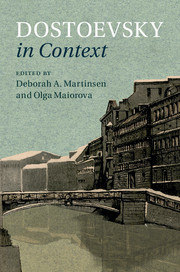Book contents
- Frontmatter
- Contents
- List of illustrations
- Notes on contributors
- Acknowledgments
- Note on citation, transliteration, glossary, and dates
- Chronology
- 1 Introduction: the many worlds of Dostoevsky
- PART I SOCIAL, HISTORICAL, AND CULTURAL CONTEXTS
- i CHANGING POLITICAL, ECONOMIC, AND SOCIAL LANDSCAPE
- ii POLITICAL, SOCIAL, AND CULTURAL INSTITUTIONS
- iii SPACE AND PLACE
- 18 Symbolic geography
- 19 St. Petersburg
- 20 The Crystal Palace
- iv RELIGION AND MODERNITY
- PART II LITERATURE, JOURNALISM, AND LANGUAGES
- Glossary
- Further reading
- Index
- References
19 - St. Petersburg
from iii - SPACE AND PLACE
Published online by Cambridge University Press: 18 December 2015
- Frontmatter
- Contents
- List of illustrations
- Notes on contributors
- Acknowledgments
- Note on citation, transliteration, glossary, and dates
- Chronology
- 1 Introduction: the many worlds of Dostoevsky
- PART I SOCIAL, HISTORICAL, AND CULTURAL CONTEXTS
- i CHANGING POLITICAL, ECONOMIC, AND SOCIAL LANDSCAPE
- ii POLITICAL, SOCIAL, AND CULTURAL INSTITUTIONS
- iii SPACE AND PLACE
- 18 Symbolic geography
- 19 St. Petersburg
- 20 The Crystal Palace
- iv RELIGION AND MODERNITY
- PART II LITERATURE, JOURNALISM, AND LANGUAGES
- Glossary
- Further reading
- Index
- References
Summary
St. Petersburg was the central city in Dostoevsky's life. In his youth in Moscow, he already looked on Russia's northern capital as a glorious literary center, celebrated by Alexander Pushkin, Nikolai Gogol, and so many others who had lived and died there. When he was 16, his father brought him and his brother to Petersburg to study at the Academy of Engineers in the Mikhailovsky Palace of the murdered Emperor Paul (to locate most of the Petersburg sites discussed in this entry see Fig. 3). At 23, he resigned his secure army position, which entailed travel, writing, “What would I do without Petersburg?” (28.1:100; Letters 1:97). At the other end of his career, in The Brothers Karamazov (1879–80) and Demons (1871–2), a Petersburg lawyer or doctor or intellectual could lord it over the provincials. Most of Dostoevsky's greatest writings are set in Petersburg: Poor Folk (1846), The Double (1846), “White Nights” (1848), Notes from Underground (1864), Crime and Punishment (1866), The Idiot (1868), “The Meek One” (1876), “The Dream of a Ridiculous Man” (1877), as well as a number of less famous works.
Peter the Great (1682–1725) had founded Petersburg a century and a third earlier, in 1703, on the swampy foundations of a much smaller Swedish settlement. When Peter moved the capital to Petersburg, the Grand Dukes of Muscovy, who had gathered territory, wealth, and power over many centuries, had long since become tsars and their territory reached far into Asia. Founded as an imperial city, Petersburg housed two great centers of power, the Court and the bureaucracy, which included the military. The other two centers of power, the Church and the landed nobility, continued to prefer Moscow for their quieter pursuits. Geographically, Peter's city controls the flat delta of the Neva, a river of some 40 miles that drains Lake Ladoga into the Baltic. Where the land rises, a dozen miles inland, and also close to the Baltic shore, stood imperial summer palaces including that in Pavlovsk, in whose park Prince Myshkin relaxes in The Idiot. For centuries, Ladoga, 100 miles long, had given access by river routes and, in the winter, by sleighs, to ancient inland cities and their farm and forest wealth. Dostoevsky owned a summer house in one of the smaller of these cities, Staraya Russa, the chief source for Skotoprigonevsk, where he sited The Brothers Karamazov.
- Type
- Chapter
- Information
- Dostoevsky in Context , pp. 168 - 175Publisher: Cambridge University PressPrint publication year: 2016



